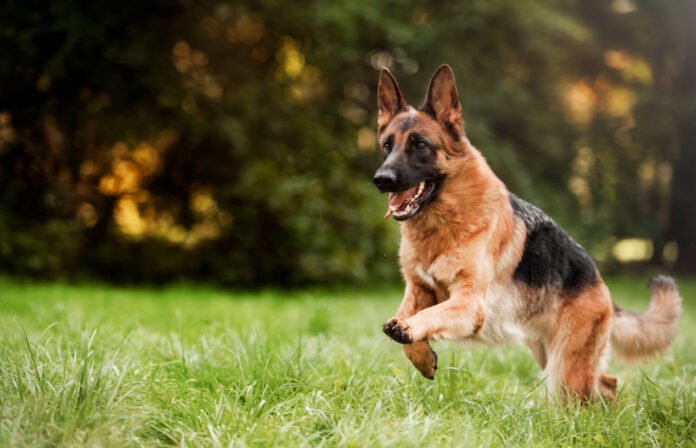German Shepherds are often sought after as pets, owing to their intelligence, courage, and loyalty. These qualities have garnered them a reputation for being excellent companions and working dogs, playing essential roles in law enforcement, search and rescue missions, and as service animals. However, potential owners should be aware of the various factors to consider before adopting a German Shepherd, as their temperament and exercise needs can vary significantly.
One of the important aspects to consider is the German Shepherd’s temperament, which is generally characterized by loyalty, intelligence, and protectiveness. These dogs are known for being good with children and other family members, particularly when they have been exposed to early socialization and training. It is crucial to understand that their temperament can differ depending on their pedigree and upbringing. For example, some shepherds bred for show dogs may have a calmer disposition, while others bred for working roles might exhibit more assertive behavior.

To ensure that a German Shepherd is an ideal pet, prospective owners should be ready to provide their dog with ample exercise and mental stimulation, as this breed is known for its high energy and need for intellectual challenges. Additionally, proper socialization and training from an early age are vital for preventing potential behavioral issues. In conclusion, German Shepherds can make excellent pets when owners are prepared to meet their unique physical and emotional requirements.
Characteristics of German Shepherds
Temperament
German Shepherds have a temperament that is often described as confident, courageous, and well-balanced. They make excellent family pets and working dogs due to their versatility and adaptability. As natural herding dogs, they can be quite protective of their family and territory, which can make them great watchdogs and guardians. However, it’s important to provide them with proper socialization and training from a young age to ensure a well-rounded temperament1.
Intelligence

German Shepherds are an intelligent breed, making them quick learners and highly trainable dogs. They enjoy learning new skills and can be taught various tricks, tasks, and commands with relative ease. As a result, they excel in disciplines such as search and rescue, police work, and assistance for people with disabilities. Their high intelligence also means that German Shepherds require mental stimulation to prevent boredom and undesirable behavior.
Energy Levels
Possessing high energy levels, German Shepherds require regular exercise to maintain their physical and mental well-being. They thrive when given a job or purpose, such as participating in dog sports, agility training, or herding activities. Regular physical activities should include:
- Long walks or hiking
- Fetch and playtime
- Swimming
- Dog sports, like agility or obedience
Providing sufficient exercise will keep your German Shepherd happy, healthy, and well-behaved.
Loyalty and Protective Nature
German Shepherds are known for their loyalty and protective instincts toward their family. They develop strong bonds with their owners and are often quite affectionate with them. Their alert and protective nature makes them excellent watchdogs, ensuring that they will notify you of any unusual activity. However, this instinct can lead to overprotectiveness if not managed with proper training and socialization. To strike a balance between guarding instincts and sociability, it’s crucial to expose your German Shepherd to various situations, environments, and people while they’re still a puppy.
Footnotes
Caring for German Shepherds
Health Considerations
German Shepherds have some common health issues. One of them is hip dysplasia, a genetic condition that leads to arthritis. Regular check-ups with the veterinarian and weight management can help prevent or mitigate these issues. German Shepherds are also prone to some gastric issues. It’s essential to provide a balanced diet and avoid overfeeding to reduce the risk of bloating and other digestive problems.
Grooming Needs

German Shepherds have a medium-length double coat that requires regular grooming to keep it clean and healthy. It is crucial to brush their coat at least once a week with a high-quality brush to remove loose hair and prevent matting. They typically shed seasonally, so more frequent brushing might be required during shedding season. Don’t forget to check and clean their ears to prevent ear infections and trim their nails regularly to keep them at a comfortable length. We recommend a King Komb when it comes to grooming a German Shepherd.
Diet and Nutrition
A well-balanced diet is essential for your German Shepherd’s overall health. They need a diet that includes the right amount of protein, carbohydrates, and healthy fats. Ensure that their dog food is specially formulated for large breeds and contains essential vitamins and minerals to support their bone and joint health. To prevent gastric issues, split their food into two or more smaller meals throughout the day rather than feeding them one large meal.
Exercise Requirements
German Shepherds are highly energetic and intelligent dogs, so they require adequate physical and mental stimulation to keep them happy and healthy. They need at least 60 minutes of exercise daily, which can include activities like walks, runs, or hiking. To provide mental stimulation, engage them in brain games, obedience training, and agility exercises. Regular outdoor activities and playtime will help create a strong bond with your German Shepherd, ensuring you have a happy, well-adjusted, and loyal companion.
Frequently Asked Questions
What are the typical personality traits of German Shepherds?
German Shepherds are known for their intelligence, loyalty, and protectiveness. They are highly trainable and excel in various roles, such as working in law enforcement, search and rescue, and as service dogs. German Shepherds are typically confident, obedient, and focused, making them a popular choice for families seeking a reliable companion. However, due to their protective nature, proper socialization is important to ensure they are comfortable with strangers and other animals.









